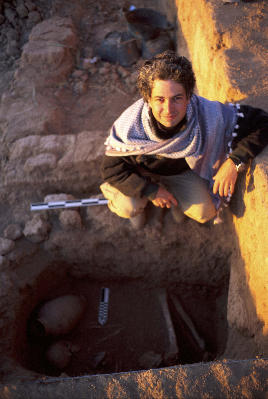iMahal Interview Series:
David Gimbel
July 22, 2001
iMahal:
So you have found a new way to fund your research, by starting a non-profit company that educates people about archeology. Our readers would be interested to know how this happens. What kind of people helped get it started, financially and otherwise?
 Gimbel:
The whole thing started as a dream for me. In the beginning, the major obstacle was getting it incorporated, which is a complex process. It requires lawyers, which I didn't have any money to pay for. So I started typing out things like mission statements; I tried to conceive how it would function, using flow charts; and then I would go out and talk to people about this idea I had. One night I happened to be at a cocktail party and I ran into a very dynamic guy who I had gone to college with years before. And he said, "If you don't find anyone else, we'll do it. I'll propose to my law firm that we take it on pro bono." This was a guy named Andrew Ruskin, who was at a firm in New York called Cadwalader and it was through his generosity and that of a partner there, David Miller, that Archaeos became a legal entity. I wouldn't have been able to do it otherwise.
Gimbel:
The whole thing started as a dream for me. In the beginning, the major obstacle was getting it incorporated, which is a complex process. It requires lawyers, which I didn't have any money to pay for. So I started typing out things like mission statements; I tried to conceive how it would function, using flow charts; and then I would go out and talk to people about this idea I had. One night I happened to be at a cocktail party and I ran into a very dynamic guy who I had gone to college with years before. And he said, "If you don't find anyone else, we'll do it. I'll propose to my law firm that we take it on pro bono." This was a guy named Andrew Ruskin, who was at a firm in New York called Cadwalader and it was through his generosity and that of a partner there, David Miller, that Archaeos became a legal entity. I wouldn't have been able to do it otherwise.
But, the next step was negotiating our first contract. It was a peculiar contract in the sense that the project, our excavation at Tell Arbid in Syria, was a joint project with the University of Vienna.

|
|
Grave in Arbid
|
I had already worked at Arbid for several years as Harvard's site representative. This was due largely to the kindness of Professor Piotr Steinkeller, whom I mentioned earlier.
The actual deal was structured between the University of Warsaw, which held the actual site license, and the University of Vienna. It had to be done between the universities-after all, who was going to sign a contract with Archaeos, an organization with no track record at the time? So a lot of my efforts involved figuring out the politics that would enable me to do what I wanted to do, since Archaeos didn't have the status to do it as an individual organization. We never had a formal contract with the Polish mission, only with the University of Vienna. The eventual contract between the two universities more or less stipulated that the joint mission between Archaeos and the University of Vienna would operate independently of the University of Warsaw's team, at a completely different area of the site, and that it would have exclusive publication rights to the excavated material.
Next I was faced with a financial problem. I had incorporated Archaeos, and I had negotiated a contract, but I didn't have any money. I had spoken about this previously with one guy, an old friend who was very interested, and he said, "If you get all this going, I'll come up with the money for you." Unfortunately, he turned out to be just a talker. As soon as he had to go out and help raise the money, he disappeared.
|
..what I found out is that you should never put anybody in a corner..
|
I think he thought I would never get this rolling, and when I did he was surprised and didn't want to do it. So all of a sudden I was stuck in the position of having an expedition that I could go direct, and having a company that I was in charge of, but not having any money to do anything. That's when I really panicked. I started going around to people, telling them what I was up to, but I never mentioned money to anybody. I just said this is what I'm interested in doing, I'd love to do this, and a lot of people started offering me money. I'm not a very effective fundraiser, but what I found out is that you should never put anybody in a corner. You just go out there, tell people what you're doing, and if they're interested in it they may make you an offer. If they're not, well, they are still your friend and the relationship remains the same because you haven't tried to twist their arm into doing anything.

All photographs copyright and courtesy of David Gimbel or Archaeos




